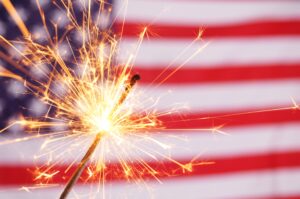
For many Americans, the Fourth of July is the highlight of the summer. Families and friends get together, fire up the barbecue, have a few drinks, take a dip in the pool, and most importantly, watch fireworks light up the Arizona sky. Unfortunately, fireworks can also be dangerous. Whether you plan on purchasing a few sparklers for the kids, attending a fireworks show, or shooting off some of your own, our Phoenix personal injury lawyers want everyone to stay safe this Independence Day. Check out our tips below for preventing injuries caused by fireworks.
Fireworks-Related Injuries in the U.S.
According to the 2020 Fireworks Annual Report conducted by the Consumer Product Safety Commission (CPSC), an estimated 10,300 fireworks-related injuries required hospital treatment between June 21 and July 21, 2020 in the U.S. Injuries caused by fireworks during this time frame represent 73% of all fireworks-related injuries reported in 2019.
What Are the Most Common Fireworks-Related Injuries?
It’s clear that fireworks on and around the Fourth of July cause injuries, but what kinds of injuries do they cause? The CPSC estimates that fireworks-related injuries primarily affect:
- Hands and fingers (30%)
- Legs (23%)
- Eyes (15%)
- Head, face, and ears (16%)
- Arms (10%)
- Trunk or other body parts (6%)
Overall, burn injuries affected about 58% of those treated at emergency rooms in 2019, with hands, fingers, arms, and legs receiving the highest number of burns. In addition to burn injuries, fireworks-related accidents may also result in contusions, lacerations, sprains, bone fractures, or blindness.
Who Is Most Likely to Be Injured by Fireworks?
There is a clear trend when it comes to the age and gender of those most likely to be injured by fireworks. For example, CPSC found that about 66% of injury victims were male, compared to just 34% female, meaning men are injured by fireworks at almost twice the rate as women.
In addition, young people are the most likely to suffer fireworks-related injuries. The study found that nearly half of all injuries were sustained by people under the age of 20. Adolescents and children are even more at risk, with 36% of all injuries suffered by children under the age of 15. That being said, adults are not immune to injuries caused by fireworks—34% of injured persons were between the ages of 25 and 44.
Which Fireworks Lead to the Most Injuries?
Based on the data published by CPSC, the following types of fireworks resulted in the most significant number of injuries in 2020*:
- Sparklers (28%)
- Firecrackers (25%)
- Missiles and bottle rockets (15.6%)
- Roman candles (12.5%)
- Reloadable fireworks (6.3%)
- Novelties (6.3%)
- Public display fireworks (6.3%)
Tips for Avoiding Injuries Caused by Fireworks in Arizona

Many people are surprised to find that many fireworks-related injuries occur because of common, legal fireworks like sparklers, firecrackers, or bottle rockets. This is all the more reason to up your fireworks safety game. Here are some tips and tricks for ensuring that your Fourth of July celebration doesn’t end in an emergency room.Only purchase and use fireworks that are legal and permissible in the state of Arizona. Check with your local government to find out if there are any additional restrictions on using fireworks in your county, city, or town. Events like wildfires may affect whether or not you can safely utilize fireworks in your area.
Using Sparklers
- Sparklers should only be handled by children aged 12 and older.
- Sparklers should always be used under adult supervision.
- If multiple people are using sparklers, they should remain at least 10 feet apart from each other at all times.
- Put all used sparklers inside a water bucket to ensure that they are fully extinguished.
Lighting Fireworks
- Only sober adults should handle or ignite fireworks.
- Light fireworks outdoors in an area that is clear of houses, dry leaves or grass, or anything else that may be flammable.
- Do not experiment with homemade or altered fireworks.
- Ensure that spectators are out of range before lighting a firework.
- Wear protective eye gear when lighting fireworks. Embers can cause eye injury or blindness.
- Only light one firework at a time.
- Never position any part of your body over a firework while lighting it.
- If a firework malfunctions or doesn’t light, don’t attempt to relight it. Soak it in a bucket of water before disposing of it.
- Never hold a lighted firework in your hands.
- Never point or throw fireworks at another person.
- Keep a bucket of water nearby for emergencies. If you have a hose, keep it at the ready in case of fire.
Injured by Fireworks on the Fourth of July?
Injuries caused by fireworks can be devastating, and may even result in death. If you or a loved one is hurt by a firework this Fourth of July and you believe that someone else’s negligence played a role, you could be entitled to serious compensation for your medical bills and lost wages, plus pain and suffering. Should you need legal assistance over the holiday, know that Lerner and Rowe Injury Attorneys is available 24 hours a day, 7 days a week to help injured victims.
To arrange your free consultation, call us anytime at 602-977-1900. We have law offices located throughout Arizona, including those in Phoenix, Glendale, Arrowhead, Mesa, Tolleson, and Chandler. There’s no obligation to hire us and no fee until we win your case. Get in touch with us today by connecting online with a LiveChat agent, filling out this simple form, or giving our office a call.



